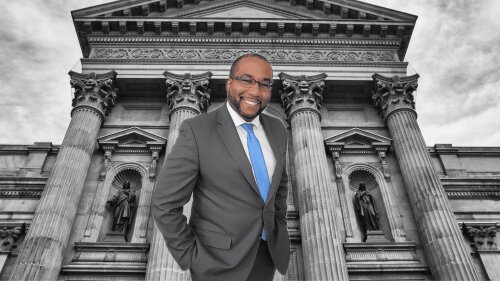Best Criminal Defense Lawyers in Chicago
Share your needs with us, get contacted by law firms.
Free. Takes 2 min.
List of the best lawyers in Chicago, United States
United States Criminal Defense Legal Questions answered by Lawyers
Browse our 1 legal question about Criminal Defense in United States and read the lawyer answers, or ask your own questions for free.
- Do you prosecute local Philippina for violating ESTAFA laws
- I was scammed by a lady presenting herself as my girlfriend.
-
Lawyer answer by mohammad mehdi ghanbari
HelloBased on the laws of the Philippines, you can file a criminal complaint against the person who scammed you for violating the laws on Estafa (swindling). Estafa is a criminal offense that involves defrauding another person of money or property...
Read full answer
United States Criminal Defense Legal Articles
Browse our 3 legal articles about Criminal Defense in United States written by expert lawyers.
- Clearing Your Record in Texas: 2026 Expunction Rules for US
- Criminal defense in the United States protects your rights from the moment of investigation through trial, sentencing, and appeals, and the stakes can include jail, fines, immigration consequences, and your future job prospects. You always have key constitutional rights: to remain silent, to have a lawyer, to be free from... Read more →
- Texas DWI Laws 2026 First Offense Penalties
- If you are arrested in the United States, you have the right to remain silent, the right to a lawyer, and the right to a fair trial - use those rights from the start. Criminal cases move quickly at the beginning: after arrest come booking, bail, your first court appearance,... Read more →
- Texas Bail Reform 2026: Why Bonds Are Harder to Secure in US
- If your loved one has just been arrested, move fast: confirm the exact charges, find out the bond amount, and contact a criminal defense lawyer immediately. In the United States, you have core rights at every stage - to remain silent, to an attorney, to reasonable bail (subject to exceptions),... Read more →
About Criminal Defense Law in Chicago, United States
Criminal defense law in Chicago, United States, refers to the body of laws and practices that govern the process of defending individuals charged with criminal activity. Chicago, as part of Illinois, operates under both state laws and the broader United States federal laws, which provide the legal framework for criminal proceedings. The city is known for its rigorous law enforcement and complex legal system, which necessitates having an adept understanding of both federal and state laws to effectively navigate criminal defenses. Criminal defense attorneys in Chicago play a crucial role in safeguarding defendants' rights, ensuring due process, and fighting for favorable outcomes in both minor and major criminal cases.
Why You May Need a Lawyer
If you find yourself facing criminal charges in Chicago, seeking legal representation from a criminal defense lawyer is critical. Here are some common situations where you may need legal assistance:
- Arrest or charge with a crime such as theft, assault, DUI, drug offenses, or white-collar crimes.
- Ongoing police investigations where you are a suspect or person of interest.
- Warrants for your arrest or searches related to your property.
- The possibility of facing significant fines, jail time, or other penalties.
- Advisement on plea deals and the potential consequences of pleading guilty.
- Needing to appeal a conviction or seek post-conviction relief.
Local Laws Overview
The legal landscape for criminal defense in Chicago is influenced by both Illinois state laws and federal laws. Here are some key aspects to be aware of:
- Illinois Criminal Code: This includes laws pertaining to various crimes such as felonies and misdemeanors, detailing offenses ranging from petty theft to serious violent crimes.
- Sentencing Guidelines: Illinois has specific guidelines which dictate sentencing for offenses, emphasizing factors like prior convictions and the nature of the current crime.
- Probation and Parole: Understanding the terms, conditions, and processes of probation and parole, including what violations entail and potential repercussions, is crucial.
- Alcohol-Related Offenses: Illinois has strict DUI laws, including zero-tolerance for under-21 DUI violations and establishing BAC limits.
- Drug Laws: Encompasses the possession, distribution, and manufacturing of controlled substances, which can range from minor to severe penalizations including enhanced sentences in specific scenarios.
Frequently Asked Questions
What is the difference between a misdemeanor and a felony in Chicago?
Misdemeanors are considered less serious crimes and generally carry lighter penalties such as fines or shorter jail time (less than one year), whereas felonies are serious crimes that can lead to substantial fines and extended imprisonment (more than one year).
What should I do immediately after being arrested in Chicago?
First, remain silent and request a lawyer. Do not discuss details of the case without a lawyer present. Exercise your right to remain silent to avoid self-incrimination and contact a criminal defense attorney as soon as possible.
How can a criminal defense lawyer help me?
A lawyer will provide legal expertise, ensure your rights are protected, negotiate plea deals, represent you in court, and help navigate through the complexities of the legal system.
Are there any alternatives to going to trial?
Yes, there are alternatives such as plea bargaining, diversion programs, and in some cases, dismissals of charges. Your lawyer can advise on the best course of action based on your circumstances.
What happens if I cannot afford a lawyer?
If you cannot afford a lawyer, you are entitled to a public defender who will represent you at no cost. Public defenders are experienced attorneys tasked with handling cases for those who lack financial resources.
How long does the criminal process take?
The length of the criminal process varies depending on the complexity of the case, court schedules, and whether the case goes to trial. Simple cases may resolve in a few months, while complex cases can take years.
Can a criminal record be expunged in Chicago?
In Illinois, certain records might be eligible for expungement or sealing. Eligibility depends on the charge type, outcome of the case, and time elapsed. Consult a lawyer to understand your qualifications.
What are my rights during police questioning?
You have the right to remain silent and request an attorney. You should be advised of your Miranda rights, which include the right against self-incrimination and the right to legal counsel.
What is bail and how does it work in Chicago?
Bail is a form of security to ensure a defendant attends all required court appearances. The specific amount is set by a judge and can vary based on the severity of the offense and risk factors associated with flight or further criminal conduct.
What is the role of a plea bargain in a criminal case?
A plea bargain is an agreement between the defendant and prosecutor where the defendant pleads guilty to a lesser charge or receives a reduced sentence. It helps resolve cases faster and can be beneficial in avoiding harsher penalties.
Additional Resources
Here are some helpful resources for those seeking legal advice or assistance in criminal defense:
- Cook County Public Defender's Office: Provides legal assistance for those unable to afford private counsel.
- Illinois State Bar Association: Offers resources and information about finding a lawyer and understanding the Illinois legal system.
- Chicago Bar Association: Provides resources including lawyer referrals and educational materials related to the legal process.
- Illinois Legal Aid Online: Offers free legal information and resources to the public, including tools for self-representation.
- American Civil Liberties Union (ACLU) of Illinois: Focuses on defending and preserving individual rights and liberties.
Next Steps
If you need legal assistance in criminal defense, consider taking the following steps to ensure you have the support required:
- Consult with a qualified criminal defense attorney to evaluate your case and discuss defense strategies. Many offer free initial consultations.
- Gather and preserve any evidence related to your case, including documents, witness contacts, and any communications related to the incident.
- Maintain a log of all incidents and communications with law enforcement or legal entities to provide a consistent account to your lawyer.
- Follow your lawyer’s guidance strictly, including attending all court hearings and refraining from discussing your case with others.
- Stay informed about your legal rights and the developments in your case by maintaining open communication with your lawyer.
Lawzana helps you find the best lawyers and law firms in Chicago through a curated and pre-screened list of qualified legal professionals. Our platform offers rankings and detailed profiles of attorneys and law firms, allowing you to compare based on practice areas, including Criminal Defense, experience, and client feedback.
Each profile includes a description of the firm's areas of practice, client reviews, team members and partners, year of establishment, spoken languages, office locations, contact information, social media presence, and any published articles or resources. Most firms on our platform speak English and are experienced in both local and international legal matters.
Get a quote from top-rated law firms in Chicago, United States — quickly, securely, and without unnecessary hassle.
Disclaimer:
The information provided on this page is for general informational purposes only and does not constitute legal advice. While we strive to ensure the accuracy and relevance of the content, legal information may change over time, and interpretations of the law can vary. You should always consult with a qualified legal professional for advice specific to your situation.
We disclaim all liability for actions taken or not taken based on the content of this page. If you believe any information is incorrect or outdated, please contact us, and we will review and update it where appropriate.
Browse criminal defense law firms by service in Chicago, United States
Chicago, United States Attorneys in related practice areas.












